Iran, Russia Sign Energy Memorandum On Eve of Putin Trip
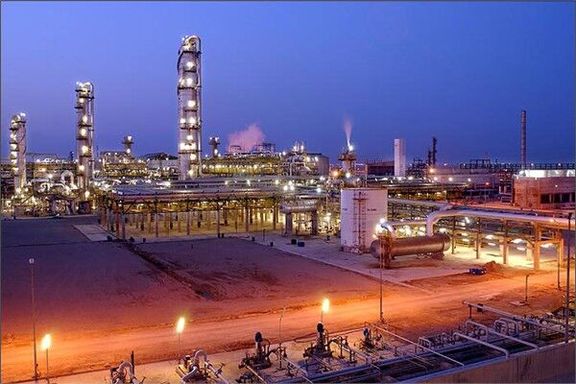
Russian energy giant Gazprom and the National Iranian Oil Company have signed a $40-billion memorandum-of-understanding on the eve of President Putin’s visit.

Russian energy giant Gazprom and the National Iranian Oil Company have signed a $40-billion memorandum-of-understanding on the eve of President Putin’s visit.
The current worth of Russia’s contracts in Iran's oil and gas fields is $4 billion, but Iran’s state news agency IRNA says if the new MoU leads to any contracts, Moscow’s total investment will increase 10-fold to $40 billion.
The agreement, as announced by the oil ministry’s Shana news agency, covers development of the Kish and North Pars gas-fields, as well as six oil fields.
It was penned during an online ceremony by the companies’ chief executives on the day Vladimir Putin arrives for a three-way summit with Iran’s President Ebrahim Raisi and Turkey’s President Recep Tayyip Erdogan.
The most significant aspect of the Gazprom-NIOC memorandum for Iran may be access to technology for LNG (liquid natural gas), which Tehran once hoped to access through agreements with western majors, especially Total, that withdrew in the face of United States ‘maximum pressure’ sanctions after 2018.
North Pars has around 33,000 billion cubic feet (bcf) of gas, and Kish gas-field 8,300 bcf. Both are currently at the feasibility stage.
While Iran has the world’s second largest gas reserves after Russia, it has been slow to develop its fields and boost exports in the face of sanctions.
Putin’s visit is being watched close with the expectation of closer links between Moscow and Tehran, boosting trade from just $4 billion in 2021, with both subject to international sanctions and as the Ukraine crisis pushes up global oil and food prices.
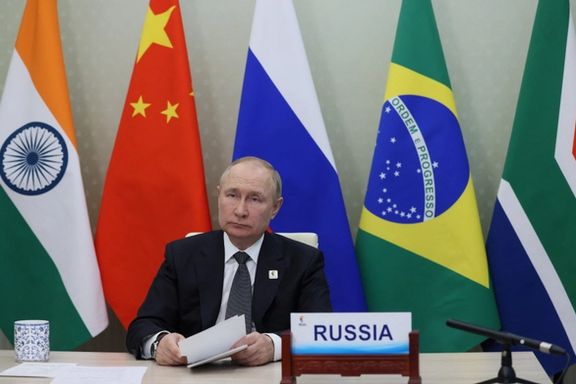
Russia's Vladimir Putin arrives in Iran on Tuesday, in a visit much anticipated by the hardliner government in Tehran and hailed as a major anti-West event.
The formal reason for Putin’s visit is a tripartite summit with his Iranian and Turkish counterparts to discusses Syria, where Tehran and Moscow back Bashar al Assad and Turkey backs the residual rebel forces in the north of the country.
Turkey's President Rcep Tayyip Erdogan also arrive in Tehran and received by President Ebrahim Raisi.
However, Iranian government-owned media has been portraying the visit as a major event to counter the West. Fars news website affiliated with the Revolutionary Guard on Tuesday splashed a headline decaling, “The end of Western monetary and financial hegemony”.
Presumably, Iran and Russia are setting up a mechanism to interchange currencies, but the outline is so vague it is impossible to clearly describe it.
Last week, the US National Security Adviser Jake Sullivan twice warned that Iran might provide military drones to Russia to be used in the Ukraine war. Iran’s foreign ministry tried to deny it, saying Tehran is neutral in the war and will not aid any side.
US State Department spokesperson Ned Price on Monday [July 18] reiterated that Washington is monitoring the situation. “Well, we’ve spoken about our concerns regarding a potential Iranian provision of UAV technology to Russia. We will continue to watch very closely. All of our sanctions remain in force,” he said, adding that such a transaction might violate of host of American and other sanctions on the two countries.
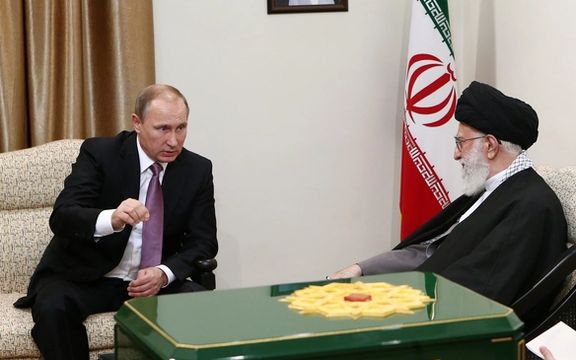
Despite their political alliance, which since the invasion of Ukraine has increasingly taken an anti-Western tone, economic transactions between Iran and Russia remain small.
Bilateral trade rose to $4 billion in 2021, but this is far less than, for example, Russia’s trade with Turkey at $33 billion, while Moscow’s exports to Iran are mainly foodstuffs, which are less vulnerable to US third-party sanctions than other sectors.
Before its costly adventure in Ukraine, Russia was mindful of US third-party sanctions on Iran and there were no major cases of, for example, banking violations.
The specter of an emerging US-backed Arab-Israeli bloc that could tilt the Middle East balance of power further away from Iran has accelerated its clerical rulers' efforts to strengthen strategic ties with the Kremlin.
"Considering the evolving geopolitical ties after the Ukraine war, the establishment tries to secure Moscow's support in Tehran's confrontation with Washington and its regional allies," Reuters quoted an unnamed senior Iranian official as saying.
Sending a clear message to the West that Russia will seek to boost ties with anti-West Iran, Putin will meet the Islamic Republic's most powerful authority, Supreme Leader Ayatollah Ali Khamenei, just a few days after US President Joe Biden visited Israel and Saudi Arabia.
Emboldened by high oil prices after the Ukraine war, Tehran is betting that with Russia's support it could pressure Washington to offer concessions for revival of a 2015 nuclear deal.
Almost a year of indirect talks between Tehran and Washington in Vienna stalled in March, with Iran questioning the US resolve and Washington calling on Tehran to drop extra demands.
But Moscow and Tehran, both subject to US sanctions, have overlapped interests. Iran, whose oil industry has struggled for years under US sanctions, has long relied on exports to China to keep the economy afloat. Since the start of Ukraine war, Moscow has taken away a big chunk of Iran's oil market in Asia.
In May, several reports said that Iran's crude exports to China have fallen sharply as Beijing favoured heavily discounted Russian barrels, leaving almost 40 million barrels of Iranian oil stored on tankers at sea in Asia and seeking buyers.
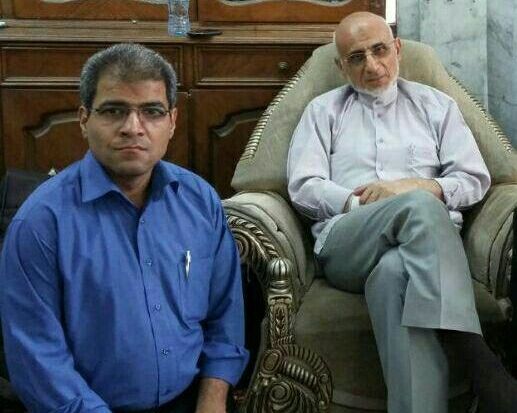
Senior Iranian conservative lawmaker Mostafa Mir-Salim confirmed Monday that his son has been detained over connections with exiled Albania-based opposition group Mujahedin-e Khalq (MEK) organization.
The representative of Tehran at the parliament, who was once a culture minister and a presidential candidate as well as Supreme Leader Ali Khamenei's chief of staff when he was president, made the remarks in an interview with Tasnim news, affiliated with the Revolutionary Guard.
He said his son was arrested in July 2019 and was sentenced to five years in prison in February 2020 on charges of acting against national security through cooperation with the MEK. He was jailed in Evin Prison in February 2021.
The MP added that the MEK had tried to use his son’s "weak point" to get classified information but his son did not have any.
He gave vague explanations about his son's "weakness" and only said, "His weakness is both physical and mental" and has made him unable to provide for his livelihood. “My son is very emotional, naive and weak-willed," and the MEK found ways to trap him and exploit his weakness, he said.
According to reports, Mehdi Mir-Salim had not gone back to prison for more than 200 days following a furlough but security forces did not arrest him. He was also granted amnesty for half of his prison term.
On July 16, Iran's Foreign Ministry sanctioned a dozens of US officials and lawmakers over their alleged support for the MEK.
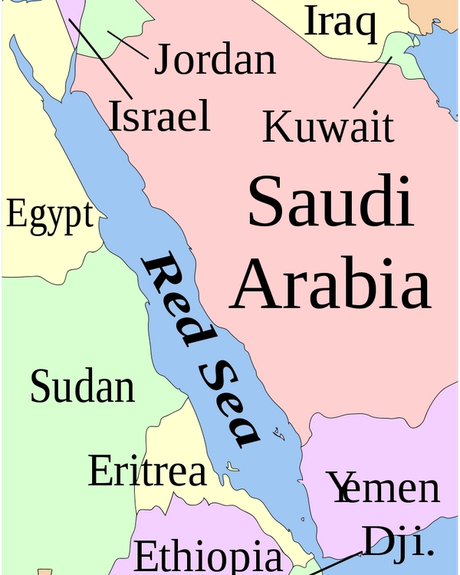
The prime minister of the Houthi-controlled administration in Yemen says Sana’a will not allow the Red Sea to become an “Israeli lake”, IRGC affiliated Fars news reported.
The premier of the so-called Yemen’s National Salvation Government, Abdel-Aziz bin Habtour, said in capital Sana'a on Monday that Yemen has the final say in the Bab al-Mandab strait and will “preserve the Arab identity of the Red Sea in the face of the US conspiracy to turn it into a Zionist lake."
"Bab al-Mandab is an international waterway, but it is part of Yemeni territory," he emphasized.
The Bab-el-Mandeb strait – located between Yemen on the Arabian Peninsula, and Djibouti and Eritrea in the Horn of Africa -- connects the Red Sea to the Gulf of Aden and acts as a strategic link between the Indian Ocean and the Mediterranean Sea via the Red Sea and the Suez Canal.
Echoing Iran’s position regarding US President Joe Biden’s tour of the Middle East and the summit of regional Arab countries in Jeddah, he said that during the visit Washington and Riyadh tried to cover up the reality of the Saudi-led “brutal aggression, the massacres, crimes and violations” they committed against Yemen, by portraying the crisis as just an internal conflict.
The Houthis receives military and political support from Iran in their conflict with other Yemenis backed who are backed by a Saudi-led coalition since 2014. Iran has been sharing its missile and drone technology with Yemen’s Houthis and has also supplied other proxy forces, such as the Lebanese Hezbollah and Iraqi Shiite militias.
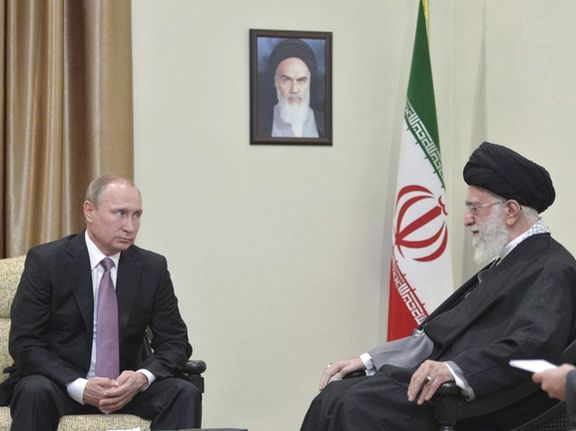
President Vladimir Putin’s trip to Tehran Tuesday seems set by the Kremlin to emphasize Russia’s continuing role in the Middle East despite the Ukraine crisis.
Yuri Ushakov, foreign policy advisor to the Russian president, told reporters in Moscow Monday that a planned meeting with Ali Khamenei, Iran’s supreme leader, was “very important” and would reflect a “trusting dialogue…on the most important issues on the bilateral and international agenda.”
Putin is also expected to meet in Tehran with visiting Turkish president Recep Tayyip Erdogan, partly to follow up trilateral discussions with Ukraine over establishing a corridor through Turkey for the export of Ukrainian grain, a move that may be soon endorsed by the United Nations. At the same time, Moscow is well aware that its own grain exports are a potential sweetener, with Dmitry Patrushev suggesting in June Russia would send supplies to “countries that are friendly to us”.
While Erdogan, despite sending arms to Ukraine, has acted as a mediator between the warring neighbors, he also wants to liaise with both Russia and Iran over Syria, where Ankara is considering stepping up an armed intervention, aimed partly in support of Syrian rebels and partly against Kurdish forces allied with Kurdish rebels in Turkey. Iran opposes the Turkish presence, which is tolerated by both Russia and the US.

While Putin has left Russia only once since the Ukraine crisis erupted in February – travelling in June to Tajikistan and for the Sixth Caspian Summit in Turkmenistan – his trip to Iran is seen as an important chance to assert Russia’s continuing role in the Middle East immediately after the visit of United States President Joe Biden to Israel and Saudi Arabia, which concluded Saturday evening after Biden told the summit of nine Arab states he would not leave in the Middle East “a vacuum to be filled by China, Russia or Iran.”
Moscow’s regional leverage
Russia wants to maintain leverage gained from years of nuanced military and diplomatic regional efforts – including its 2015 military onslaught in Syria that tipped war in favor of President Bashar al-Assad, its intelligence sharing and political ties with Israel, its coordination with Saudi Arabia of global oil supplies through Opec+, and its diplomatic cooperation with Iran.
The Iran-Russia relationship has been well discussed in both Tehran, where some politicians regularly criticize Moscow’s continuing role in Iran’s nuclear talks with world powers, and in Washington. US officials have lately alleged that Russian officers visited Iran in June and July to look into possibilities for deploying Iranian-made attack drones for the Ukraine war. President Ebrahim Raisi met Putin in Moscow in January, and again at the Caspian Summit in June, when the Iranian president joined the leaders of Russia, Turkmenistan, Kazakhstan, and Azerbaijan, and expressed a desire to build economic ties.
But many analysts argue that Russia and Iran are far from partners, whether in arms or business. Bilateral trade rose to $4 billion in 2021, but this is far less that, for example, Russia’s trade with Turkey at $33 billion, while Moscow’s exports to Iran are mainly foodstuffs, which are less vulnerable to US third-party sanctions than other sectors.
And while Tehran has been benefiting from rising oil prices, its sales to China, which make up most of its exports dues to US sanctions, have been hampered by Moscow selling to Beijing at a discount after being shut out of much of western Europe due to the Ukraine invasion.
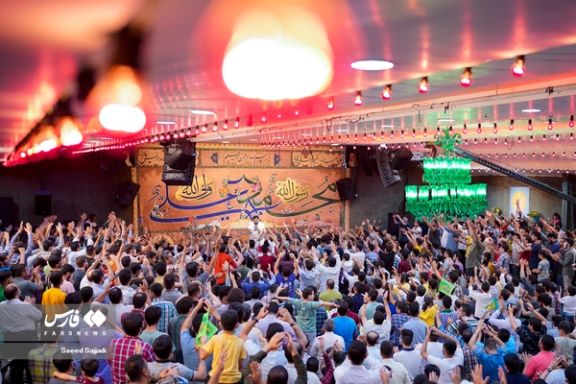
While health authorities in Iran have announced the seventh wave of Covid-19 pandemic, the government organized a “10-kilometer-long” ceremony to celebrate a religious holiday in Tehran.
According to IRNA on Monday, the ceremony on Valiasr Street -- one of Tehran's main thoroughfares and commercial centers said to be the longest street in the Middle East, was organized on the occasion of Eid al-Ghadir, a Shiite commemorative holiday, claiming that it was the biggest gathering in the city ever.
Similar ceremonies were also held in many cities across the country while the growing number of Covid-19 patients has prompted the Health Ministry to announce new restrictions.
The spokesman for Iran’s Covid-19 taskforce, Abbas Shirozhan, said Monday that the number of fatalities due to covid-19 has increased 40 percent within the past week. Iran’s daily infection numbers have 5,000 cases daily, and deaths are growing in double-digit numbers.
According to epidemiologists, two new subvariant of Omicron, namely BA4 and BA5 -- which started in the African continent -- may soon prevail over the country.
The number of overall deaths in Iran since Covid-19 emerged in February 2020 has been 300,000 higher than in previous years, suggesting pandemic deaths may be more than officially reported.
Iran has reported around 141,000 deaths from Covid, the Middle East’s highest official level, leaving 160,000 more deaths unexplained.